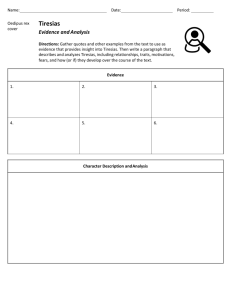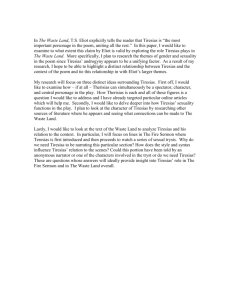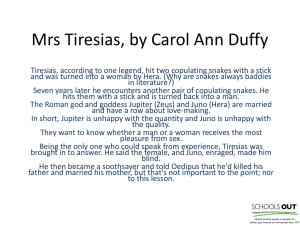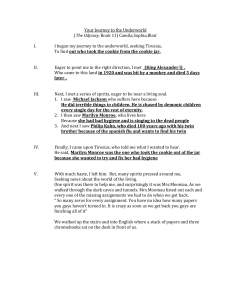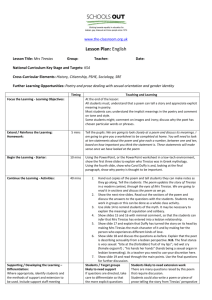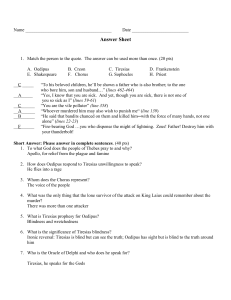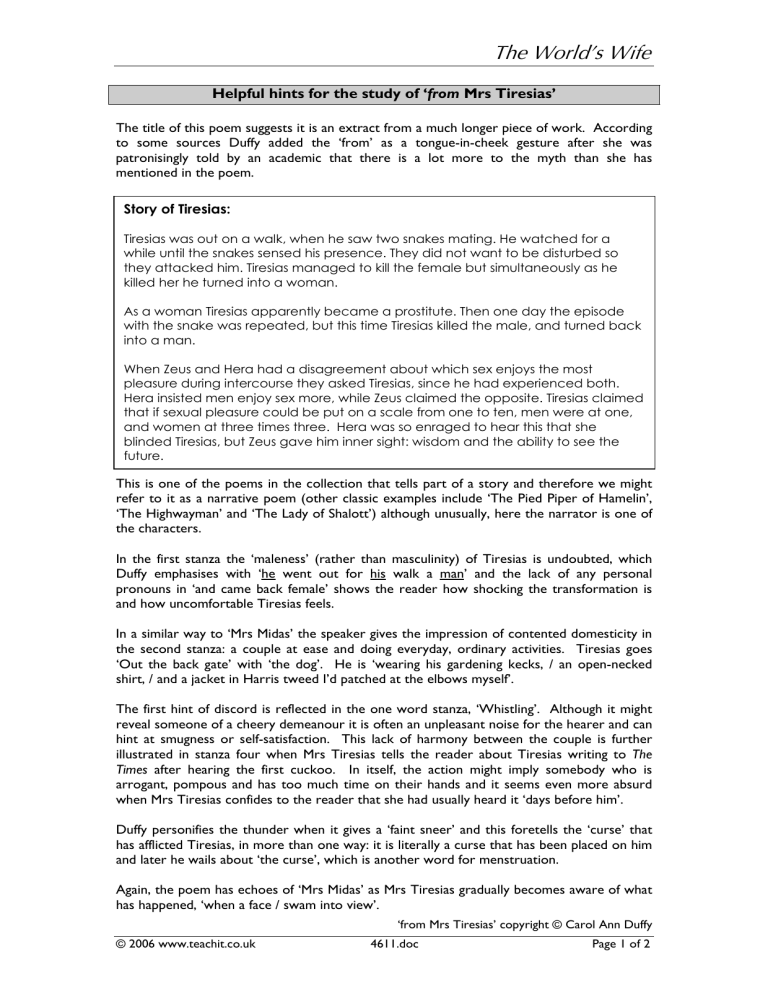
The World’s Wife Helpful hints for the study of ‘from Mrs Tiresias’ The title of this poem suggests it is an extract from a much longer piece of work. According to some sources Duffy added the ‘from’ as a tongue-in-cheek gesture after she was patronisingly told by an academic that there is a lot more to the myth than she has mentioned in the poem. Story of Tiresias: Tiresias was out on a walk, when he saw two snakes mating. He watched for a while until the snakes sensed his presence. They did not want to be disturbed so they attacked him. Tiresias managed to kill the female but simultaneously as he killed her he turned into a woman. As a woman Tiresias apparently became a prostitute. Then one day the episode with the snake was repeated, but this time Tiresias killed the male, and turned back into a man. When Zeus and Hera had a disagreement about which sex enjoys the most pleasure during intercourse they asked Tiresias, since he had experienced both. Hera insisted men enjoy sex more, while Zeus claimed the opposite. Tiresias claimed that if sexual pleasure could be put on a scale from one to ten, men were at one, and women at three times three. Hera was so enraged to hear this that she blinded Tiresias, but Zeus gave him inner sight: wisdom and the ability to see the future. This is one of the poems in the collection that tells part of a story and therefore we might refer to it as a narrative poem (other classic examples include ‘The Pied Piper of Hamelin’, ‘The Highwayman’ and ‘The Lady of Shalott’) although unusually, here the narrator is one of the characters. In the first stanza the ‘maleness’ (rather than masculinity) of Tiresias is undoubted, which Duffy emphasises with ‘he went out for his walk a man’ and the lack of any personal pronouns in ‘and came back female’ shows the reader how shocking the transformation is and how uncomfortable Tiresias feels. In a similar way to ‘Mrs Midas’ the speaker gives the impression of contented domesticity in the second stanza: a couple at ease and doing everyday, ordinary activities. Tiresias goes ‘Out the back gate’ with ‘the dog’. He is ‘wearing his gardening kecks, / an open-necked shirt, / and a jacket in Harris tweed I’d patched at the elbows myself’. The first hint of discord is reflected in the one word stanza, ‘Whistling’. Although it might reveal someone of a cheery demeanour it is often an unpleasant noise for the hearer and can hint at smugness or self-satisfaction. This lack of harmony between the couple is further illustrated in stanza four when Mrs Tiresias tells the reader about Tiresias writing to The Times after hearing the first cuckoo. In itself, the action might imply somebody who is arrogant, pompous and has too much time on their hands and it seems even more absurd when Mrs Tiresias confides to the reader that she had usually heard it ‘days before him’. Duffy personifies the thunder when it gives a ‘faint sneer’ and this foretells the ‘curse’ that has afflicted Tiresias, in more than one way: it is literally a curse that has been placed on him and later he wails about ‘the curse’, which is another word for menstruation. Again, the poem has echoes of ‘Mrs Midas’ as Mrs Tiresias gradually becomes aware of what has happened, ‘when a face / swam into view’. ‘from Mrs Tiresias’ copyright © Carol Ann Duffy © 2006 www.teachit.co.uk 4611.doc Page 1 of 2 The World’s Wife Mrs Tiresias gives the impression that, despite her shock, she recovers herself quickly which Duffy shows through one stanza finishing with Mrs Tiresias ‘passed out’ and the next beginning with ‘Life has to go on.’ We must remember that the character of ‘Mrs Tiresias’ is recalling all these events at a later date so, in a sense, she is an unreliable narrator: she is conveying her opinions of Tiresias and the situation after she has been cast aside. There is a sense, in the next few stanzas that, despite her shame, Mrs Tiresias makes an effort to be supportive to her husband. The reason for his change of gender is not reported to the reader and we might infer many things from this: Mrs Tiresias has not been told? She is too ashamed? It is insignificant to the story? The contrast of the stanza that ends, ‘sisterly, holding his soft new shape in my arms all night’ and the next one-line stanza, ‘Then he started his period’, signals to the reader the change in feeling that Mrs Tiresias has for her husband: an overtly hostile note creeps in to the poem emphasised by the ascending numbers in the next stanza which reflect Tiresias’s ever increasing needs. The words used to describe Tiresias and his actions in the following stanzas reveal Mrs Tiresias’s rising anger and bitterness: ‘demanding’, ‘selfish pale face’, ‘snapped’ and ‘It got worse’. There are hints of Tiresias’s prostitution in lines such as ‘out and about’, ‘glitzy restaurants’ and ‘on the arms of powerful men’. Duffy might not be imagining that Tiresias literally became a call-girl but that he metaphorically prostituted himself: in other words he played up to the stereotype of how women behave and look. As with many of the other poems in the collection Duffy has grafted modern ideas, theories, behaviour, language and goods on to legendary characters. Here, Tiresias appears to frequent chat shows, sharing his/her feelings: of course the irony is that when Tiresias is ‘telling the women out there / how, as a woman himself, / he knew how we felt’ he actually has no idea. The statement also has echoes of patronising celebrities and wealthy stars who claim to have an understanding of how ordinary women feel about and cope with domestic life. Again, there are hints of Mrs Tiresias’s bitterness in such lines as, ‘His flirt’s smile’ and ‘A cling peach slithering out from its tin. / I gritted my teeth.’ The two harsh ‘i’ sounds reflect the harshness and slightly grating sound that Tiresias’s voice has. The ‘tinned peach’ image hints at something unbearably sweet, manufactured and quite unlike the real thing. In the last stanza the confusion felt by the reader over who the ‘he’ and the ‘her’ are possibly reflects the bewilderment and awkwardness that Mrs Tiresias and Tiresias feel at this meeting. Again, the artificial nature of items ‘glittering’ and ‘tinkling’ suggest the unease and discord between them. The repetition of ‘her bite’ in the stanza seems intended to taunt Tiresias: Mrs Tiresias is, and always has been, a lesbian (?) unfulfilled by her husband and now extremely aware of and eloquent about the sensuous nature of a loving relationship. The word ‘clash’ in the final line seems to have a double meaning: the literal jarring and noise of Tiresias’s and the lover’s bejewelled hands meeting but also the animosity that they feel towards one another. ‘from Mrs Tiresias’ copyright © Carol Ann Duffy © 2006 www.teachit.co.uk 4611.doc Page 2 of 2
